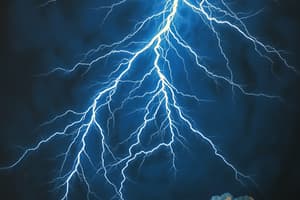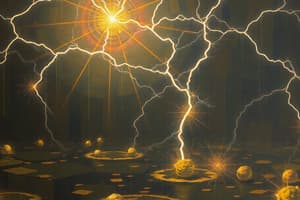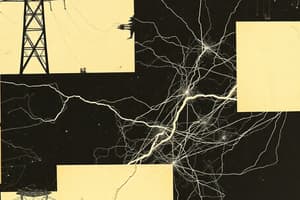Podcast
Questions and Answers
Which one of the following best describes static electricity?
Which one of the following best describes static electricity?
- A buildup of electric charges on the surface of a material
- An imbalance of electric charges between two materials (correct)
- A flow of electric charges through a conductor
- A discharge of electric charges into the atmosphere
What happens when a static electric charge is brought close to an electrical conductor?
What happens when a static electric charge is brought close to an electrical conductor?
- The charge is amplified
- The charge is transferred
- The charge is absorbed
- The charge is neutralized (correct)
What causes a static shock?
What causes a static shock?
- The flow of electric charges through an electrical conductor
- The separation of two surfaces after contact (correct)
- The discharge of electric charges into the atmosphere
- The buildup of electric charges on the surface of a material
How is static electricity different from current electricity?
How is static electricity different from current electricity?
What is required for a static electric charge to be created?
What is required for a static electric charge to be created?
Flashcards
What is static electricity?
What is static electricity?
An imbalance of electric charges between two materials.
What happens to static electricity near a conductor?
What happens to static electricity near a conductor?
The charge is neutralized.
What causes a static shock?
What causes a static shock?
The separation of two surfaces after contact.
How is static electricity different from current electricity?
How is static electricity different from current electricity?
Signup and view all the flashcards
What is required for a static charge to be created?
What is required for a static charge to be created?
Signup and view all the flashcards
Study Notes
Static Electricity Overview
- Static electricity is the buildup of electric charge on the surface of materials, typically caused by friction between two objects.
- Static electricity is characterized by the absence of a flow of current; charges accumulate until they are discharged.
Interaction with Conductors
- When a static electric charge is brought near a conductor, it induces movement of charges within the conductor.
- Free electrons in the conductor redistribute themselves, leading to one side becoming negatively charged and the opposite side positively charged due to polarization.
Cause of Static Shock
- A static shock occurs when accumulated static charge is discharged, typically when a person touches a conductive object.
- The sudden flow of electric charge can cause a brief, noticeable sensation known as electrostatic discharge.
Static vs. Current Electricity
- Static electricity involves stationary charges, while current electricity is the continuous flow of electric charge through a circuit.
- Current electricity requires a conductive path and is used to power devices, unlike static electricity which can exist without any motion of charges.
Requirements for Static Charge Creation
- Static electric charges are created through processes like friction, contact, or separation of materials, causing electrons to transfer from one object to another.
- Insulating materials are often involved, allowing charge accumulation without dissipation.
Studying That Suits You
Use AI to generate personalized quizzes and flashcards to suit your learning preferences.



